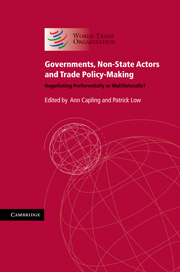Book contents
- Frontmatter
- Contents
- List of figures and tables
- List of contributors
- Acknowledgements
- Disclaimer
- Introduction
- 1 The domestic politics of trade policy-making: state and non-state actor interactions and forum choice
- 2 Chile
- 3 Colombia
- 4 Mexico
- 5 Indonesia
- 6 Thailand
- 7 Jordan
- 8 Kenya
- 9 South Africa
- 10 The influence of international non-state actors in multilateral and preferential trade agreements: a question of forum shopping?
- 11 Main findings and conclusions
- Index
- References
Introduction
Published online by Cambridge University Press: 05 July 2014
- Frontmatter
- Contents
- List of figures and tables
- List of contributors
- Acknowledgements
- Disclaimer
- Introduction
- 1 The domestic politics of trade policy-making: state and non-state actor interactions and forum choice
- 2 Chile
- 3 Colombia
- 4 Mexico
- 5 Indonesia
- 6 Thailand
- 7 Jordan
- 8 Kenya
- 9 South Africa
- 10 The influence of international non-state actors in multilateral and preferential trade agreements: a question of forum shopping?
- 11 Main findings and conclusions
- Index
- References
Summary
Gone are the days when trade policy decisions were settled by one or two government ministries and conveyed with little ceremony to parliament and the public. Evolving views and practices on participatory decision-making, along with a policy-making environment that continues to grow in complexity, have changed the manner in which national trade policy is formulated. The number of governmental authorities and agencies implicated in national trade policy dialogues has multiplied, and so too has the number and diversity of non-state actors (NSAs) laying claim to a say in policy deliberations. This array of parties, including both business and civil society organizations (CSOs), will frequently be pulling governments in different directions. They will also make greater efforts in some policy contexts than others.
The transformation of trade policy-making has attracted considerable attention from scholars and practitioners alike, and there have been many studies that explore the broadening of the trade policy agenda, the emergence of new actors seeking to influence that agenda and the need for governments to manage the growing complexity and politicization of trade policy. However, most of this work has focused on the impact of these changes at the global level, particularly in relation to the workings of the World Trade Organization (WTO), rather than at the domestic level where trade policy-making actually begins. And while there is growing interest in measures taken by governments to ‘democratize’ trade policy development by making it more open, inclusive and participatory, this literature is largely descriptive, with little analysis of the impact of these processes and interactions on the decisions ultimately taken by governments.
- Type
- Chapter
- Information
- Governments, Non-State Actors and Trade Policy-MakingNegotiating Preferentially or Multilaterally?, pp. 1 - 3Publisher: Cambridge University PressPrint publication year: 2010



